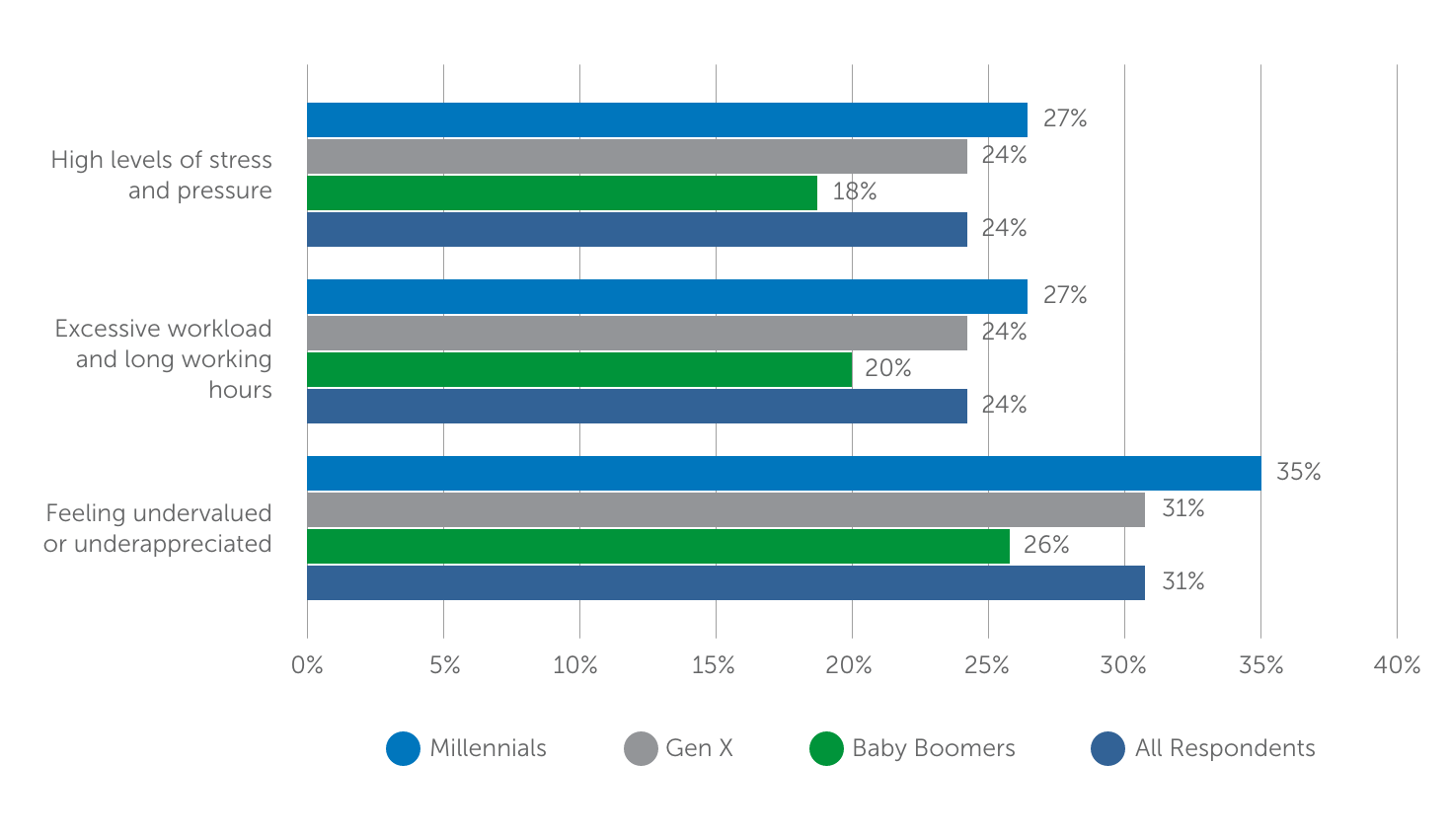The meaning of burnout is changing
Among healthcare providers, the definition of “burnout” is shifting beyond simple exhaustion and overwork. Our survey indicates that feeling undervalued or underappreciated is now the top contributor to burnout, with 31% of responses. It came in above more traditional understandings of burnout, such as excessive workloads and high levels of stress.
How do different generations perceive burnout?
- Baby Boomers (ages 59-77): This group is less likely to report burnout and is more likely to feel engaged and valued in their work.
- Gen X (ages 43-58) and Millennials (ages 27-42): Younger generations experience burnout differently, with a stronger emphasis on feeling undervalued, stressed, and lacking work-life balance. For these groups, burnout is less about physical exhaustion and more about emotional and psychological strain.
Top Factors Contributing to Burnout:

For many, especially younger generations, burnout is increasingly about feeling disconnected from the value and impact of their work, but there are ways burnout can be addressed in medical settings. Acknowledging this change is crucial for developing effective strategies to combat burnout for those in care delivery roles.
Engagement in healthcare workplaces
Engagement remains a critical factor in job satisfaction and retention of healthcare providers. According to our survey, fewer than half of responses (48%) report a high level of engagement in their jobs. That said, a majority feeling they are on track with their career goals.
How do different generations feel about engagement with their work?
- Baby Boomers: This generation shows the highest engagement levels and feels they are steadily progressing in their careers.
- Gen X and Millennials: While engaged, these groups experience more moments of disengagement, often tied to the factors driving burnout, such as undervaluation and lack of support.
Professional Development in the Medical Workforce
Career progression is closely linked to engagement. Seventy-five percent of survey responses feel they are making significant strides toward their career goals, which aligns with the high engagement levels reported.
Retention: What Keeps Healthcare Providers Loyal to their Employers?
Retaining healthcare providers is a significant challenge, especially as burnout evolves. Responses illustrate what motivates providers to stay at their current organization:
- Compensation, Bonuses, and Benefits: Cited as a top retention motivator 67% of responses.
- Flexible Hours and Part-Time Work: Selected by 44% of responses.
Generational Differences
- Gen X and Millennials: These groups are most motivated by higher compensation and better benefits.
- Baby Boomers: As they approach or enter retirement, Baby Boomers are more motivated by the option to work part-time or have flexible hours.
Summary and Takeaways
The 2023 survey shows that burnout, engagement, and retention are not only highly interconnected concepts with significant bearing on how healthcare providers perceive their work, but also highly granular and individual perceptions that evolve organically, especially when viewed through a generational lens.
As the definition of burnout shifts and different generations experience work in particular ways, healthcare organizations must adapt their strategies to foster a supportive and engaging environment. Tailoring approaches based on these insights will be crucial for improving job satisfaction, reducing turnover, and ultimately maintaining a content workforce that delivers top quality patient care without being bogged down by workplace resentment.
The healthcare experts at LocumTenens.com examine the unique needs of individual facilities and can design a workforce strategy that keeps your workforce operating at 100%. Whether that means closing gaps in specialized care, designing models for flexible work, or equipping you with real-time workforce data to empower strategic decision-making, we can take your care to the next level with targeted, tailored solutions.





